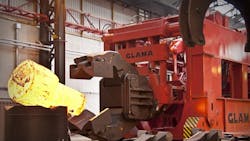Defects Confirmed in Steel Forgings for Nuclear Reactors
The French nuclear regulatory agency Autorité de Sûreté Nucléaire (ASN) has confirmed a discovery of safety-defects in about 400 forged parts produced since 1965 for nuclear reactors built by Areva. The agency narrowed its statement to indicate about 50 of the parts are installed in nuclear reactor plants operating in France. It did not comment on any forgings that may have been installed in reactors elsewhere.
France has 19 nuclear power plants that consist of 58 nuclear reactors, which supply an estimated 75% of the nation's electricity. Those plants are operated by a utility, Électricité de France (EDF), which is slated to take over the nuclear-reactor construction business that Areva developed.
Areva is a multinational organization active in nuclear energy system design, development, and operation. Its European Pressurized Reactor (EPR) pressurized-water nuclear reactors are installed at numerous power plants in Europe, and more recently in China.
The inquiry was initiated more than a year ago after weaknesses were discovered in forged steel parts supplied for the EPR III being built at Flamanville, France. ASN. Areva’s Creusot Forge subsidiary produces large-dimension steel forgings needed in the construction of nuclear reactor vessels.
Creusot Forge produced the upper and bottom sections of the reactor pressure vessel being installed by Areva for the Flamanville EPR in September 2006 and January 2007, using now-outdated standards for carbon content in the steel, according to reports. The suspected weakness in the forgings is based on testing conducted according to subsequently implemented, more stringent regulatory standards.
When doubts were expressed in 2015 about the quality control and steel carbon content in the forged parts for the Flamanville installation, Areva announced it would conduct additional studies on its production practices and finished parts produced at Creusot.
Areva submitted its conclusions from this review to ASN last October, and the agency then requested more data, concerning forgings produced earlier than the initial inquiry addressed. ASN then directed Areva to provide a list of suspected forgings and an analysis of the possible impact on security for France's nuclear power plants. "The review will have to assess how serious these anomalies are and what the consequences are for the safety of the installations," according to an ASN statement.
In a well received visit to Creusot Forge after the announcement of the report’s findings, France’s incoming Minister of the Economy and Industry, Emmanuel Macron, reaffirmed the importance of the nuclear power sector, the economic necessity of the EDF-Areva combination, and the French government’s commitment to “ensure, sustain and secure its energy future” with the nuclear power.
About the Author
Robert Brooks
Editor/Content Director - Endeavor Business Media
Robert Brooks has been a business-to-business reporter, writer, editor, and columnist for more than 20 years, specializing in the primary metal and basic manufacturing industries. His work has covered a wide range of topics including process technology, resource development, material selection, product design, workforce development, and industrial market strategies, among others.
Currently, he specializes in subjects related to metal component and product design, development, and manufacturing—including castings, forgings, machined parts, and fabrications.
Brooks is a graduate of Kenyon College (B.A. English, Political Science) and Emory University (M.A. English.)

